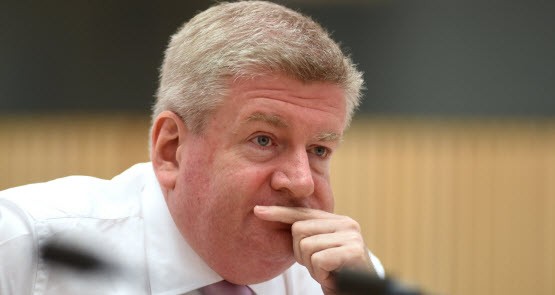
The government has refused to release details of whom Communications Minister Mitch Fifield met with in his first few months of the job, claiming his calendar is “not purely factual information” about who has the ear of the minister.
Following the Administrative Appeals Tribunal decision last year ordering the office of Attorney-General George Brandis to process a freedom of information request for his diary from his shadow counterpart, Mark Dreyfus, Crikey filed a number of similar requests to the offices of other government ministers.
There is no obligation for ministers to keep a public diary, but the diary for the first few months of Fifield’s reign as Communications Minister would be of particular interest as Fifield dealt with complex matters of media ownership reform, ABC and SBS funding, the Digital Transformation Office, copyright reform, and ongoing issues with the National Broadband Network rollout.
Fifield has faced strong lobbying from media owners to change media ownership rules, and anti-siphoning regulations.
Unlike Brandis’ office, Fifield’s chief of staff Darren Disney actually processed the request, but he has refused to release details. Disney claims the list of people who met with Fifield would “contain deliberative matter” and was not prepared for the purpose of being made public.
“The diary is maintained solely for internal purposes to assist in planning the minister’s workload and that of his office. It assists the minister and his office to consider options to plan the minister’s workload and engagements on any given day or time,” Disney said.
Disney argues that the calendar frequently changes, and “does not necessarily reflect the actual activities of the minister and may not be an accurate historical record of the minister’s activities”. It is a “workload planning tool” to help the minister undertake his role, and therefore would be considered a “deliberative process” that can be exempt from being released under FOI, Disney argues.
To release the diary would compromise the “efficient and proper functioning” of Fifield’s office, and could damage “close working relationships” between the minister’s office and agencies such as Australia Post and NBN.
Dreyfus told Crikey in a statement that the claim to exempt Fifield’s diary was “absurd”.
“This is an absurd claim of exemption. A record of appointments clearly does not contain deliberative matter,” Dreyfus said.
Crikey has appealed the decision, arguing that meeting records are metadata; they do not contain deliberative matter because they do not disclose the content of those meetings.
Brandis is also spending tens of thousands of dollars of taxpayers’ money appealing against the AAT’s order to process Dreyfus’ request for his diary. Brandis has said it is important to get “clarification” from the courts on whether 2400 diary entries related to 270 people would have to be considered as part of the request. Previous diary entries from both Foreign Minister Julie Bishop and former prime minister Julia Gillard have been released under FOI law in the past.








Crikey is committed to hosting lively discussions. Help us keep the conversation useful, interesting and welcoming. We aim to publish comments quickly in the interest of promoting robust conversation, but we’re a small team and we deploy filters to protect against legal risk. Occasionally your comment may be held up while we review, but we’re working as fast as we can to keep the conversation rolling.
The Crikey comment section is members-only content. Please subscribe to leave a comment.
The Crikey comment section is members-only content. Please login to leave a comment.